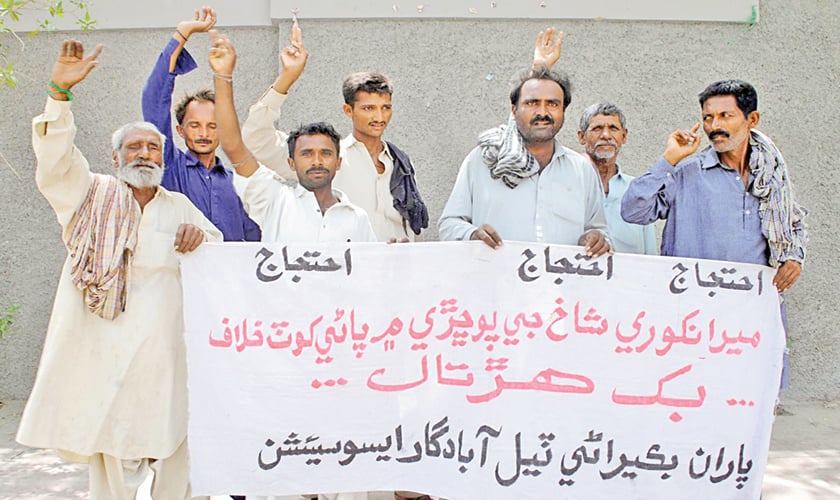AGRICULTURE
An old canal Kakol Wah, also known as Mehar branch, irrigating rice fields in Dadu district, has been discarded, leaving a large number of farmers, herders and other communities in a helpless situation.
 Kakol Wah is part of the Rice Canal, feeding lands through 57 watercourses along its 19 kilometre length. Besides water shortage at tail end, illegal encroachment at the banks of the canal, and dumping of sewerage water from towns into the canal are main reasons the growers dependent on this water body are facing hardships.
Kakol Wah is part of the Rice Canal, feeding lands through 57 watercourses along its 19 kilometre length. Besides water shortage at tail end, illegal encroachment at the banks of the canal, and dumping of sewerage water from towns into the canal are main reasons the growers dependent on this water body are facing hardships.
Bashir Mahesar, a local farmer, said before lining the canal in 2004, aiming to reduce seepage loss of irrigation water, it was clean and was also a source of drinking water for Mehar Town and the people residing along the canal throughout its way. “But now the water is not safe for human and livestock consumption, because the lining, by adding an impermeable layer to the edges of the trench, has blocked the recharging underground water,” he added.
Bashir said the opinion behind lining was to stop seepage of 30 to 50 percent of irrigation water from canals. “In their understanding it was to make the irrigation system more efficient. But the results of lining the canal have been adverse on underground water in nearby villages.”
According to him, this canal used to supply water to Mehar town and recharged the underground water, keeping the environment stable. Now Mehar town and other areas have developed a supply line from main Dadu canal, which is costly. Mehar Taluka itself consists of more than 150 villages, where the population is forced to use contaminated water.
Looking at the gravity of the issue, Kakol Wah Bachayo Jedojehad Committee, led by small-scale farmers has marked the third year of struggle. The committee was launched on April 24, 2015 in Mehar Town, Dadu district. Since then the dedicated famers have continued their untiring struggle and staged sit-ins at the camp, which attracts a large number of supporters daily to demand rehabilitation of the important source of drinking and irrigation water for the area.
During the visit of the protest camp in Mehar Town, a community leader Sikandar Sodhar, escorted by a group of activists, said, "There is a vicious circle, acting under the tutelage of certain land grabbers and we with the support of peaceful people are fighting the menace to save canal, crops, source of income of the community, livestock, and natural beauty.”
He claims the struggle was the first of its kind launched by small growers, and after mobilisation, the farmers realised their ownership and offered to join the campaign voluntarily. That is the secret of this campaign’s success.
Elderly growers of the area recall the blissful days when they used to produce first class fragrant quality of rice, including the prince of rice 'basmati'. These old rice varieties have now disappeared from the area due to various reasons.
Most of these growers who are participating in the campaign want to promote the use of locally adapted healthy seed varieties to get a good crop that has a high yield potential. These varieties have natural resistance to lodging under normal farmer management.
The protesting farmers plead to introduce paddy varieties requiring less water and giving better yield in the area. According to them, the agriculture research institutes have not been able to produce the required seeds to help save the food crops.
Due to the unnecessary interventions of the leaders of certain political parties, the irrigation system has collapsed, they alleged. Reports gathered from protesting growers say that the major rice-growing zone, which comprises over 400,000 acres of cultivable land, fed by the main Rice Canal and its tributaries, including Kakol Wah, is facing an acute shortage of water. In Dadu district, almost all crops of Kharif and Rabi, like wheat, rice, cotton, sorghum (jowar), pearl millet (bajra), sesame, and tobacco are grown. The growing of flowers, fruits and vegetables, though is not practiced on a large scale or a commercial scale, ample horticulture is carried out to fulfil the needs of locals of the district.
Mashooq Bhatti said there are many interest groups, including leaders of the mainstream political parties, elected legislators and district administration, who encourage certain mafias. This acute water shortage has forced many farmers to stop cultivating their lands. Mashooq said despite all these problems and severe shortage of water, the Sindh Irrigation Department officials remain apathetic and indifferent about the matter.
He pointed out the conflicts within stakeholder government departments and institutions. For example, he said irrigation department officials initiate desiltation of canal. But after completing the process, they want the municipal authority to remove the mud from the canal bank in their jurisdiction. “As a result, it is only the people who suffer while living and working in this filthy atmosphere,” he added.
 Irrigation department officials and municipal committee representatives, when contacted blamed each other, throwing a pack of allegations at the other party to avoid the answering questions or giving clarifications.
Irrigation department officials and municipal committee representatives, when contacted blamed each other, throwing a pack of allegations at the other party to avoid the answering questions or giving clarifications.
The protesting farmers also asked the government to save them from certain multinational companies who were selling products of fertilisers and pesticides, which were poisoning the water of the canal, polluting the environment, causing human diseases, and the death of friendly insects and wildlife.
The three major canals, including Rohri, Dadu and Rice canals built in 1932 with a total length of more than 421 miles, are considered the backbone of the irrigation system in Sindh. The main Rice Canal was designed for rice cultivation, which flows only in Kharif season.
The growers also pointed out that the inquiry commission on water canals designed by the Supreme Court also visited the area, held a meeting with stakeholders and issued directives to clean and rehabilitate the canal while also removing encroachments. Though, encroachment was removed at some places the situation still exists.
On top of all this, the active growers, standing at the forefront of the campaign have been facing threats for a long time, and are also being intimidated with probable dire consequences.
The writer is a staff member